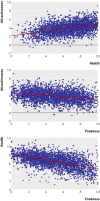Beauty sleep: experimental study on the perceived health and attractiveness of sleep deprived people
- PMID: 21156746
- PMCID: PMC3001961
- DOI: 10.1136/bmj.c6614
Beauty sleep: experimental study on the perceived health and attractiveness of sleep deprived people
Abstract
Objective: To investigate whether sleep deprived people are perceived as less healthy, less attractive, and more tired than after a normal night's sleep.
Design: Experimental study.
Setting: Sleep laboratory in Stockholm, Sweden.
Participants: 23 healthy, sleep deprived adults (age 18-31) who were photographed and 65 untrained observers (age 18-61) who rated the photographs.
Intervention: Participants were photographed after a normal night's sleep (eight hours) and after sleep deprivation (31 hours of wakefulness after a night of reduced sleep). The photographs were presented in a randomised order and rated by untrained observers.
Main outcome measure: Difference in observer ratings of perceived health, attractiveness, and tiredness between sleep deprived and well rested participants using a visual analogue scale (100 mm).
Results: Sleep deprived people were rated as less healthy (visual analogue scale scores, mean 63 (SE 2) v 68 (SE 2), P<0.001), more tired (53 (SE 3) v 44 (SE 3), P<0.001), and less attractive (38 (SE 2) v 40 (SE 2), P<0.001) than after a normal night's sleep. The decrease in rated health was associated with ratings of increased tiredness and decreased attractiveness.
Conclusion: Our findings show that sleep deprived people appear less healthy, less attractive, and more tired compared with when they are well rested. This suggests that humans are sensitive to sleep related facial cues, with potential implications for social and clinical judgments and behaviour. Studies are warranted for understanding how these effects may affect clinical decision making and can add knowledge with direct implications in a medical context.
Conflict of interest statement
Competing interests: All authors have completed the Unified Competing Interest form at
Figures


References
-
- Deten A, Volz HC, Clamors S, Leiblein S, Briest W, Marx G, et al. Hematopoietic stem cells do not repair the infarcted mouse heart. Cardiovasc Res 2005;65:52-63. - PubMed
-
- Doyle AC. The case-book of Sherlock Holmes: selected stories. Wordsworth, 1993.
-
- Lieberman MD, Gaunt R, Gilbert DT, Trope Y. Reflection and reflexion: a social cognitive neuroscience approach to attributional inference. Adv Exp Soc Psychol 2002;34:199-249.
-
- Drummond SPA, Brown GG, Gillin JC, Stricker JL, Wong EC, Buxton RB. Altered brain response to verbal learning following sleep deprivation. Nature 2000;403:655-7. - PubMed
-
- Harrison Y, Horne JA. The impact of sleep deprivation on decision making: a review. J Exp Psychol Appl 2000;6:236-49. - PubMed
Publication types
MeSH terms
LinkOut - more resources
Full Text Sources
Medical
